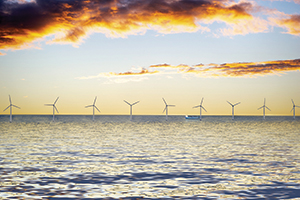
Posted to News on 26th Jul 2021, 00:00
Improving wind power quality
The Danish government recently made history with the commission of the world’s first energy island. The island will house 200 giant wind turbines to power three million households across Denmark, and could support neighbouring nations such as Germany and the UK. Although wind is abundant, ensuring a consistent, high-quality power output can be challenging.

With COP26, the latest United Nations climate change summit, on the horizon, many countries are recognising the urgent need to effectively reduce emissions from their power sectors. The International Renewable Energy Agency (IRENA) has recognised that scaling up wind power will play an essential role in decarbonising power generation.
Simone Bruckner, managing director of power resistor manufacturer Cressall Resistors, says: “Wind is in plentiful global supply with no geographical limitations, meaning that all nations can tap into this valuable resource. However, when it comes to power generation, its inconsistency can present a problem. Wind speed constantly fluctuates depending on atmospheric pressure, which results in a variable power input for wind turbines. While everywhere can use wind, it’s difficult to guarantee its availability and secure a consistent power supply on a day-to-day basis.”
With a rising proportion of the grid coming from variable renewable sources like wind power, there needs to be adequate measures to ensure grid stability and reliability for consumers. For wind to be upscaled for widespread use – as is the case with Denmark’s energy island – the inconsistent, unpredictable input needs to be converted into a consistent, reliable output.
This is where generator choice plays a huge role in maximising the wind power capture of a turbine, which in turn determines its ability to produce a high-quality power output as cost-effectively as possible. “Consistency is key,” says Bruckner. “Wind turbine generators have an operational range – the minimum and maximum wind speeds at which the generator connects to the power grid. Maximising this range to include the widest scope of speeds possible is essential to providing a reliable power output.”
One of the most common generator types is the doubly fed induction generator (DFIG), which enables wind turbines to operate at variable speeds. The stator windings of the DFIG are integrated directly into the power grid, while the rotor windings are connected to a convertor via slip rings. The advantage of this system is that the rotor frequency, which directly correlates to wind speed, can freely differ from the grid frequency, which in the UK is 50 Hertz (Hz).
The converter separates the input and output of the generator, allowing for a consistent output of power from the stator into the grid, regardless of the input speed into the generator from the wind turbine. “One challenge to DFIG function arises if the rotor speed exceeds the operational range of the system due to extremely high winds,” says Bruckner. “In such scenarios, it is not possible to control the generator output in the same way due to the high rotor voltage.
“If high voltages aren’t appropriately managed, they can lead to high currents and amplified voltage transients, which in turn can destroy elements of generator systems such as the converter diodes. Therefore, preventing high rotor voltages is essential to avoiding equipment failure and power outage on the grid.”
To protect DFIGs, a crowbar circuit is used. If the rotor current reaches its upper limit, crowbar resistors, which are connected directly to the rotor windings of a DFIG, prevent damage to the generator by disconnecting the convertor. Crowbar resistors are designed with a low inductance to reduce the impact of high transient frequencies, and can withstand high currents while remaining operational.
“Commissioning large wind turbine projects, such as the Danish energy island, is essential to increasing the renewable input of our power grids,” Bruckner concludes. “However, increasing the quantity of turbines alone will not allow us to reach renewable power targets. Using electrical components, like DFIGs, which are specifically designed with the challenges of wind power in mind, allows for high-quality power generation that could secure the renewable grid for the sustainable future of our planet.








